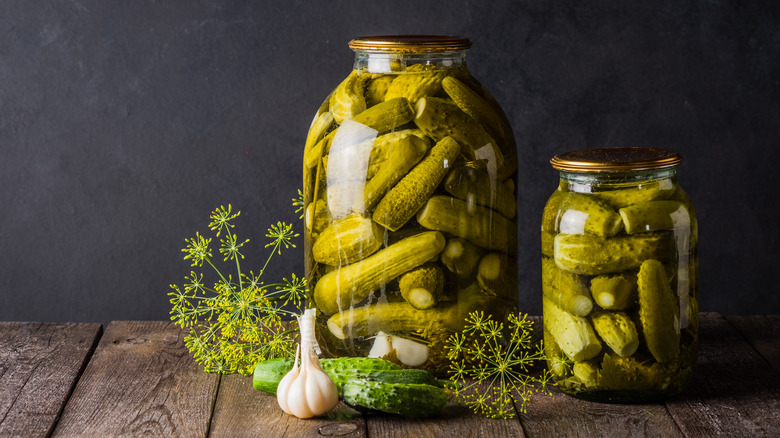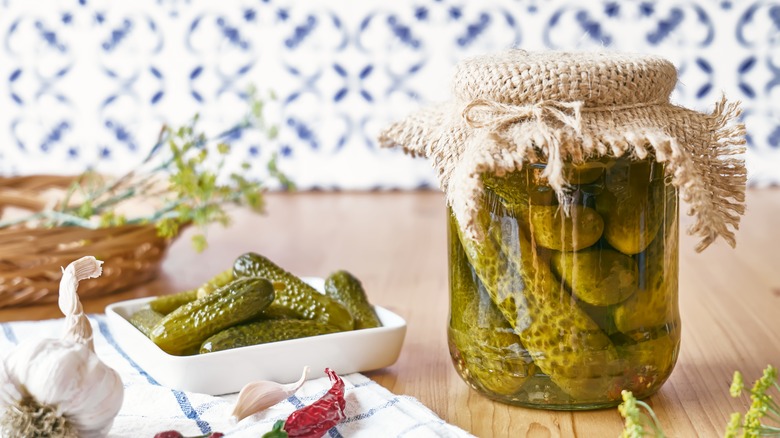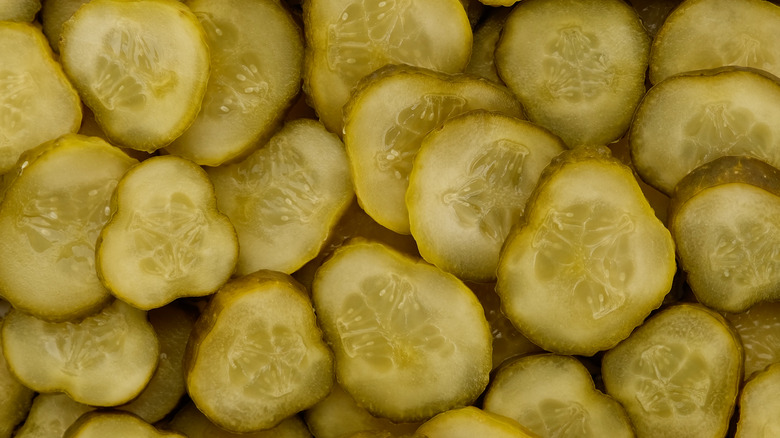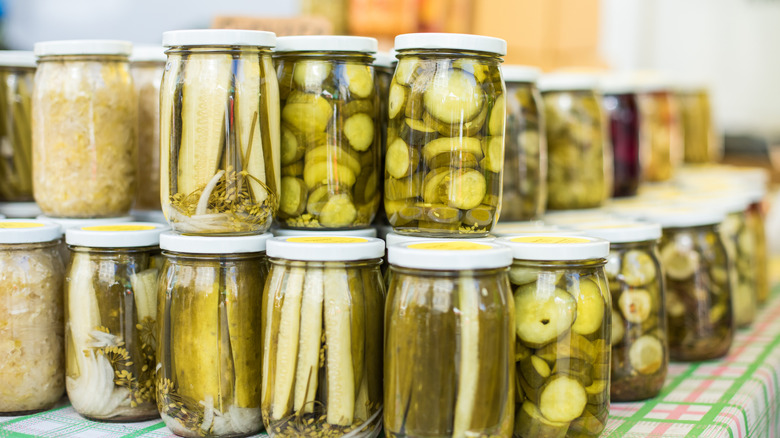Here's How Dill Pickles Got Their Name
Spoiler alert: dill pickles are made with copious amounts of dill. We know, we know, this is effectively showing how the sausage is made, pulling back the curtain on a magic trick, etc., etc. — but let's be honest, it's right there in the name! No flowery introductions here; the flavor and essence of dill permeates dill pickles, flavoring the crisp, puckering acidic snack or side with a familiar intensity that is both comforting and timeless.
Dill pickles — a perfect option for the masses because they're gluten-free, dairy-free, nut-free, vegan, and comply with numerous dietary limitations — have been relegated to "sandwich side dish" for eons. Pickled vegetables, giardiniera-type dishes, or items like pickled mustard seeds are a bit more unique and tend to stand on their own a bit more, but it's rare that an entire dish is based around a pickle. Pickle juice (or brine) is also a respected component of many libations. Rarely, though, does the spotlight itself land on the pickle, until now.
What exactly are dill pickles?
PBS defines pickles as a delicious snack "created by immersing fresh fruits or vegetables in an acidic liquid or saltwater brine until they are no longer considered raw or vulnerable to spoilage." PBS notes that dill pickles are made with "garlic, spices, kosher salt, and clean water," in addition to dill, of course. Allrecipes differentiate dill pickles from other pickles because of the brine itself. A sour pickle is 'pickled' via a fermented mixture rich with salt, while dill pickles are pickled with a vinegar-based brine. Allrecipes also notes that certain dill pickles are also flavored with dill seeds or oil in addition to just the frilly fronds and verdant stems.
It is unknown exactly when the verb 'pickling' soon transmogrified, turning the word into a noun meaning 'cucumber preserved in pickling liquid' — but that's obviously where we are now. Perhaps a pickle-centric entomology lesson should be next on the horizon?
A brief history of dill pickles
Mental Floss credits none other than Amerigo Vespucci as one of the first "pickle-dealers" (a term "derisively" coined by Ralph Waldo Emerson), who would help produce supplies that would last on a long sea-faring journey to the 'New World.' Preserved and dried foods — including pickles – were paramount for these arduous journeys. Shakespeare even references pickles repeatedly throughout his oeuvre! Fun fact: did you know that it was Shakespeare who coined the term "in a pickle?"
Delishably notes that pickles themselves may have originated from the ancient Egyptians or Indians, in which "fish and melons" and the "green mango of Andhra Pradesh" were other progenitors of the now-ubiquitous pickles.
History dates dill itself back to 900 AD, when dill itself "arrived in Western Europe from its native Sumatra ... although ancient Greeks and Romans used it extensively centuries earlier." Pickles also raged in popularity once canning was formalized and made safe. History also notes that pickle juice or brine is said to relieve cramps better than water, according to a study from Brigham Young University.
A modest, simple side - or something more?
Claudia Roden, author of "The Book of Jewish Food," states that "pickled vegetables were a dietary staple for Jews living in the Ukraine, Poland, Lithuania and Russia," per PBS. The notable, pungent flavor and crisp snap was a far cry from some of the duller culinary offerings of the time, and pickles soon became a popular option. Beyond flavor and the convenience of mobility, pickles were also perfect because they'd ferment and then be able to last throughout the colder months when fresh produce wasn't as readily available. In the late 1800s, many Eastern Europeans migrated to New York City — and along with them came dill pickles.
Soon enough, pickles were sold on push carts throughout the city's lower east side in the early 1900s, before becoming a staple of Jewish delis. The rest is history. So the next time you mindlessly munch on a pickle alongside your roast beef sandwich, think about the journey that the humble, now commonplace culinary delight really embarked on.



